Hire Power Platform Consultant: A Complete Guide
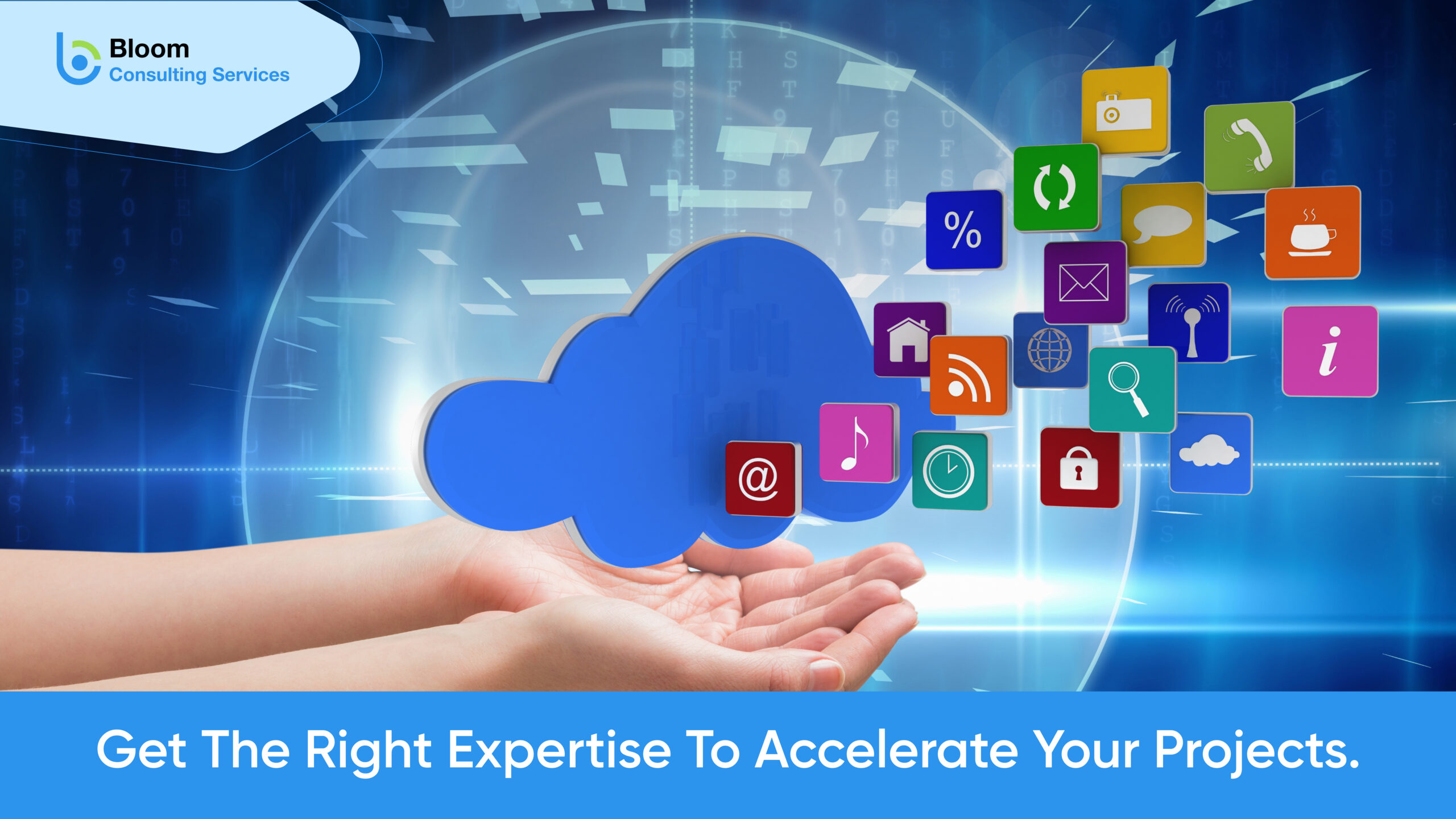
In this highly competitive era, organizations face immense pressure to streamline processes, set productivity targets, and effectively utilize the data at their disposal. To this end, an expert Power Platform consultant offering Power Platform Consulting Services can ensure that the solutions delivered via the Microsoft Power Platform, a low-code environment comprising Power Apps, Power Automate, Power BI, and Power Virtual Agents, are of the highest quality.
These professionals achieve their objectives by streamlining workflow automation, building custom applications, and designing complex analytical dashboards. However, it’s not just about finding someone with the right skill set. Clearly defining the consulting role, evaluating expertise, and ensuring alignment with your company’s goals are essential steps in engaging a consultant effectively.
This comprehensive checklist covers the entire process, from identifying the necessary qualifications and certifications to finding the most capable professionals for the job. Following this guide enables you to select a consultant confidently, ensuring significant and lasting results.
Table of Contents
What is the Role of a Power Platform Consultant?
A Power Platform consultant helps organizations design, implement, and optimize solutions using Microsoft’s Power Platform, comprising Power Apps, Power Automate, Power BI, and Power Virtual Agents. Their role includes understanding business requirements, building custom applications, automating workflows, creating interactive reports, and ensuring seamless integration with existing systems. They also provide guidance on best practices, governance, and adoption strategies, enabling organizations to leverage the platform effectively for improved productivity, data-driven decision-making, and operational efficiency.
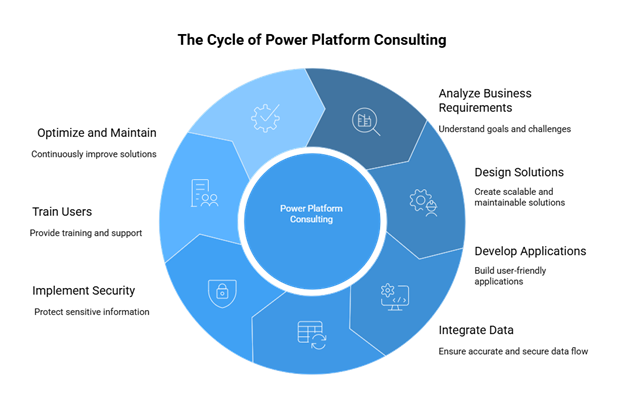
1. Analyzing Business Requirements
A Power Platform consultant will analyze your organization’s goals, workflows, and challenges. They will work with stakeholders to define the scope of the project, identify opportunities for automation, and outline ways in which Power Platform tools can provide solutions to the business pain points. Such an alignment ensures that the solutions they work on will be aligned with your strategic objectives.
2. Architecture and Designing Solutions
Once all the requirements have been finalized, the consultant designs the solution by designing the process and the data flows to make sure the payload or workflow can be scaled and maintained. They recommend the most fitting combinations of Power Apps, Power Automate, Power BI, and Power Virtual Agents to achieve the desired results.
3. Customization and Application Development
Based on your customization requirements, your certified Power Platform consultant will develop your applications. They create simple, powerful applications through low-code or no-code methods that users can deploy quickly and that meet more complex requirements. They will also ensure seamless user experiences and integration into existing systems.
4. Data Integration and Management
One of the important roles is to make Power Platform work with existing data systems established in your organization. These data systems may be Microsoft Dataverse, SQL databases, or third-party APIs. Consultants doubled down so data is accurate, secure, and handed down for decisions at every level of the organization.
5. Setting Security and Compliance
Besides building solutions, the Power Platform consultant would bridge development, testing, and operation of other key security systems, including firewalls, intrusion detection systems, enterprise malware systems, and software deployment tools. Your Power Platform solutions shall be in-house in terms of regulatory frameworks and security policies to eliminate any inadvertent exposure of any sort of sensitive information.
6. Training for End-Users and Adoption Support
Even the best solution will fail to deliver results without a team trained to use it effectively. Training sessions are conducted, manuals are provided, and ongoing support ensures proper adoption. The team addresses any questions or issues that arise while actively seeking feedback to enhance the solution for even greater impact.
7. Continued Optimization and Maintenance:
In contrast to many other options, your Power Platform consultant does not deliver the project and disappear. Instead, he will observe the daily operation of the solution, searching for opportunities for improvements, and adapt the solution as your business changes so that your investment keeps making positive returns even after it is deployed.
Read More: SharePoint Power Automate: Best Practices & Use Cases
How Should You Hire a Power Platform Consultant?
So, if any wonder would be: “How do I hire a Power Platform consultant?” It goes beyond resumes. Instead, candidates must be strategically identified to solve the end goal for the business-who will fit into the team and deliver with metrics provided by Microsoft Power Platform.
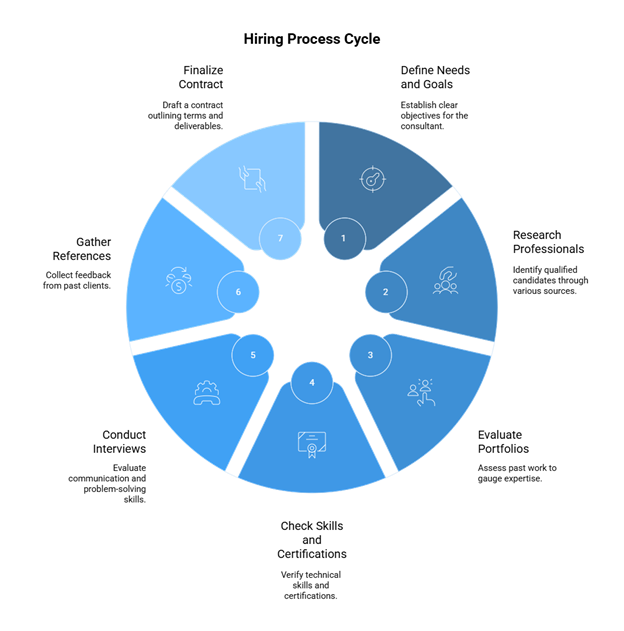
1. Defining Your Needs and Goals
Before you begin looking, you basically want to know what you really want out of a Power Platform consulting expert. Does your project involve creating workflows for automation, developing custom apps, advanced-level reporting, or all three? It will be much easier to list down those candidates who present the right balance of skills and experience when you can set clear-cut objectives to follow.
2. Researching Qualified Professionals
Those who seek an experienced consultant in Power Apps, Power Automate, Power BI, and Power Virtual Agents must be wary, although a good candidate will have a portfolio of projects that reinforce their subject expertise. Microsoft Partner Network and LinkedIn should be consulted, and well-known consulting firms could be referred to for locating candidates that fit your requirements.
3. Evaluating Portfolios and Case Studies
By reviewing past work, you can determine what level of projects they are used to and how complex the ones they take on are. A decent Power Platform consultant should be able to present case studies of the deployments that they have done, with measurable results, solving problems in actual business scenarios.
4. Checking for Technical Skills and Certifications
The application of knowledge is important, but it is equally necessary that the consultant have Microsoft certifications to prove the possession of the technical know-how. Among those considered for consultation, make sure they are Microsoft Certified: Power Platform Functional Consultant Associate or any related certifications in Power BI, Power Apps, and Power Automate. This will ensure that the one you hire meets the industry standards.
5. Interviewing and Practical Tests
Communication and simplification of abstract concepts form an aspect of the Power Platform consultant’s job. Interviews testing communication skills, problem-solving abilities, and sometimes technical knowledge are helpful. If feasible, adding a practical exercise to probe real-world approaches is an excellent step.
6. References and Client Feedback
Nothing is better than past results being a yardstick of future performance. Talk to their former clients about how the consultant handled timelines, incorporated feedback, or worked with actual expectations. Positive reviews and repeat clients also speak for reliability.
7. Contracts and Deliverables
After choosing the best consultant in Power Platform, draft a contract illustrating the scope of work, deadlines, and deliverables, and payment terms, so both parties are on the same page, minimizing any risk of misunderstanding during the life of the project.
Hire a Certified Power Platform Consultant
What to Look for in a Power Platform Consultant?
Knowing what to look for in a Power Platform consulting expert helps you find those professionals who can provide a high-quality, business-oriented solution to issues. This section describes the options you should value more in choosing your short list of candidates.
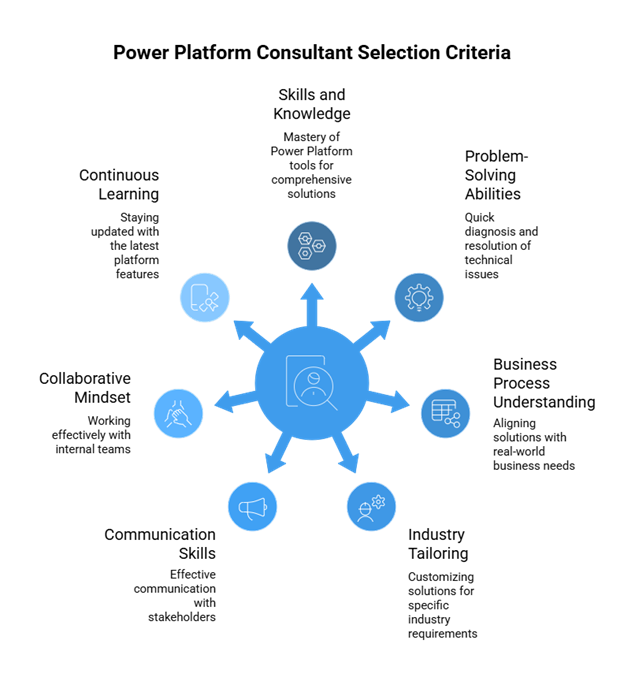
1. Skills and Knowledge of Essential Power Platform Tools
Before you even begin interviewing, any good Power Platform expert should and implemented to prove their worth, discuss at length, and practice his or her knowledge of the entire Microsoft Power Platform: Power Apps, Power Automate, Power BI, and Power Virtual Agents. This allows them to present solutions that are complete and all-encompassing. For example, from designing a custom Power App for data entry, to automating approval workflows with Power Automate, to visualizing live metrics in Power BI, and finally to letting Power Virtual Agents deploy a chatbot to handle inquiries. Without mastery of all four, you run the risk of fractured solutions that do not speak the same language, so to speak, thereby limiting your ROI.
2. Strong Problem-Solving Abilities
Technical skills must be complemented by solid problem-solving skills. Apart from their technical skills, the successful Power Platform consultant will need to have problem-solving skills in diagnosing bottlenecks, integration issues, and inefficient workflows. During the development stage, even before issues arise, they should foresee what needs to go wrong, almost immediately data duplication or performance slowdowns-and fix it very quickly. When problems suddenly present themselves, Consultants must pivot swiftly, adapting workflows or rewriting integrations without affecting business operations.
3. Business Process Understanding
Microsoft Power Platform will always make the most impact when used in real-world business problems. For this reason, a good Power Platform consulting expert must combine technical know-how with strong knowledge of business processes. They evaluate the current process, map out workflows, and then pinpoint exactly where automation, data visualization, or custom applications can create quantifiable improvements. It might be eliminating manual entry of data for finance, faster approvals in HR, or actionable insights to sales teams.
4. Tailoring to Your Industry
Every industry has unique challenges, compliance requirements, and operational particularities. A Power Platform consultant with experience in the relevant sector already knows these requirements and can develop solutions accordingly. For example, in healthcare, they would give top priority to HIPAA compliance and patient data security; in finance, regulatory compliance and transaction monitoring would be their concern; in manufacturing, their concern would be optimizing production workflows and visibility into supply chains. The ability to fit into the industry is a guarantee that the solutions are not just operational but compliant and strategically aligned with the needs of your business.
5. Excellent Communication Skills
Since making an intricate subject easy for a layman to understand is the hallmark of an outstanding Power Platform consulting professional, the consultant must develop good communication skills to reach every stakeholder party, such as executives, project managers, developers, and end-users, to always ensure their alliance. This encompasses delivering presentations of the solution design, running training, documenting workflows, and collecting user feedback, all in a manner that aids and does not confuse the client.
6. Collaborative Mindset
Since Power Platform projects may require collaboration across divisions, an excellent Power Platform consultant will work alongside your internal teams, take their feedback into consideration, and adjust the solutions with the requirements as they evolve. They stand in partnership with the client, at every point and in all decisions, ensuring solutions are defined not only by technical best practices but also by the team’s practical experience.
7. Commitment to Continuous Learning
Upgrades keep on rolling through the Microsoft ecosystem with new Power Platform features, security updates, and AI integrations being handled almost regularly. A committed Power Platform consultant stays well ahead of these changes, adopting best practices and new capabilities to allow your solutions to retain their competitive advantage. This ensures the profession will be valuable in the long run rather than becoming redundant.
Why Hire a Power BI Consultant?
Consider the significance of a Power BI consultant within an organization. It brings about a complete change in how data is interpreted and used in organizations. Instead of having stagnant spreadsheets, you get dynamic, interactive dashboards with stirring real-time insights. This, in turn, allows very swift, accurate, and strategized decision-making at all levels in the organization.
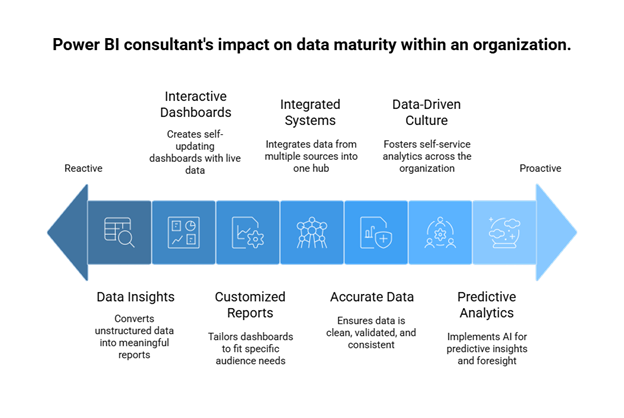
1. Turning Raw Data into Insights
Data is collected by most organizations in huge volumes, but without the right tool, it ends up underutilized. A Power Platform consultant, with technical skills in Power BI, analyzes raw datasets in an unstructured form and converts them into meaningful, visually rich reports. They prepare data using Power Query, do further calculations using the DAX formula language, and apply complex data modeling techniques to find patterns, trends, and anomalies within the data. For example, those consulting services may convert millions of records of transactions into a sales performance dashboard that shows which regions or products are underperforming in one snapshot.
2. Building Interactive Dashboards
Since static reports require manual updating, they can get out of date very quickly. Hence, a Power Platform consulting expert can set up Power BI dashboards that update on their own by retrieving live data from different sources. Users can filter the information on these dashboards, drill through into specifics of the metrics, or view the same data in different perspectives. For example, regional managers may be able to have a global sales view of all trends and instantly filter for their own territory without waiting for any other report.
3. Customizing Reports for Decision-Makers
Sometimes, stakeholders might not require the same information. Executives may need summarized KPI, whereas operational staff might need more detailed breakdowns of performance. The Power Platform expert seeks to customize dashboards and reports to fit the requirements of the various target audiences. This helps the decision-maker to focus on information about insight that is important to them, which increases efficiency and accuracy in decision-making.
4. Integration with Other Systems
An important feature of Power BI is the capability of being multi-source. From a Power Platform point of view, Power BI can be integrated with CRM systems, ERP platforms, Azure services, and third-party applications- all together being considered a reporting hub wherein all critical business data exists in one place and does not have to be dumped out of multiple tools.
5. Ensuring Data Accuracy and Reliability
Business intelligence stands on the ground of data; the better the data, the better the BI. The Power Platform consultant ensures data is cleaned, transformed, and validated so that reports use accurate and consistent data. Because there is trust in analytics, decision-makers feel comfortable making decisions.
6. Cultivating a Data-Driven Culture
Beyond dashboard-making, the Power Platform expert instills a culture of data-driven decision-making by training, documenting, and fostering a self-service kind of analytics, which employees at any level can tap into for insights on their own. Then, an agile and informed organization is made possible.
7. Increasing the Powers of Predictive Analytics
An advanced Power Platform consulting expert can weave AI and machine learning models inside Power BI reports to deliver predictive analytics, speeding company service towards sales trends on the one hand, and to turn away customer churn or the disruption of the supply chain on the other-in-the the competitive standards where timely precaution is the best salutation!
Key Skills to Look for in a Power Platform Consultant
The role goes much further than traditional technical consulting; the consultant is basically a strategic partner in aligning Microsoft’s low-code ecosystem with customer business goals. The ideal candidate would combine technical skills with problem-solving abilities and business understanding, all wrapped in a team spirit. Some other characteristics of an excellent Power Platform consultant include:
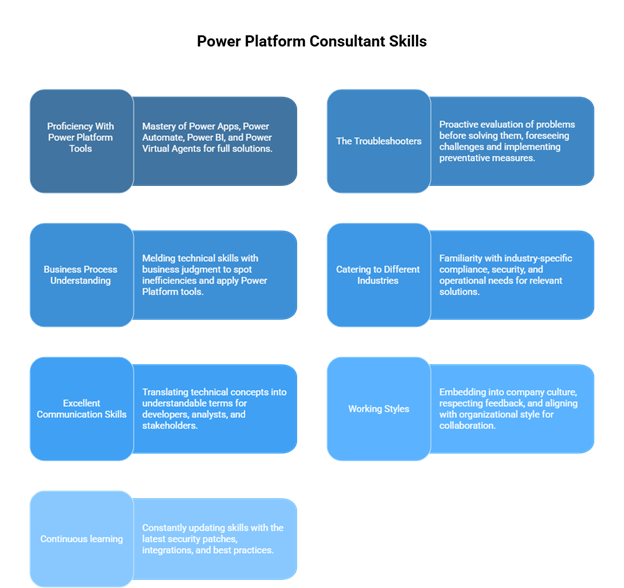
1. Proficiency With Power Platform Tools
A worthy consultant would know how to play with all four major components: Power Apps, Power Automate, Power BI, and Power Virtual Agents. Such mastery of tools enables the provision of a full solution rather than disconnected applications; hence, they can do custom business apps, complex workflow automations, insightful dashboards, and AI-powered chatbots into one great system.
2. The Troubleshooters
Specialist skills in and of themselves are not sufficient. One great Power Platform consultant is a thinker, and they are very proactive in evaluating problems before solving them. These individuals foresee challenges, perhaps relating to workflow bottlenecks or breakdowns in data integration and multi-system process alignment, and put measures in place to either circumvent those challenges or to lessen their disruptive impact.
3. Business Process Understanding
The very best consultants hold technical skills with good business judgment. They assess your current processes to spot inefficiencies, then apply Power Platform tools to produce tangible results, whether that means reduction of manual work, cutting down on expenses, or improving user satisfaction. Their recommendations are founded not just on what technically can be done but also on what makes the greatest operational difference, and. industry-specific experience:
4. Catering to Different Industries
Different industries have different compliance, security, and operational needs. A consultant familiar with your industry, whether it be finance, healthcare, manufacturing, or the public sector, will be aware of your particular data sensitivities, legal mandates, and workflow constraints. So, the solutions they design will no longer simply act but must be compliant and relevant to the context of your business.
5. Excellent Communication Skills
The Power Platform consultant commonly serves as the intermediary between developers, business analysts, and senior stakeholders. They must be able to translate highly technical concepts into terms that businesspeople will understand so that everyone may agree on those concepts. Likewise, the consultant ought to be able to document processes formally, provide training to key stakeholders, and maintain communication with all project stakeholders throughout the entire project life cycle.
6. Working Styles
Most capable consultants don’t work in isolation. They embed themselves into the culture of your company. They respect feedback, incorporate suggestions, and even ensure that the approach aligns with organizational style. Collaboration helps build trust and ensure implementation and utilization in the long run.
7. Continuous learning
The Microsoft Power Platform is always changing as it is being updated with the latest security patches and integrations. While the consultant is constantly updating his skills, your solutions are kept future-ready and are implemented with the latest features and best practices.
Benefits of Hiring the Right Power Platform Consultant
Beyond sheer technical implementation, having the right Power Platform consultant in partnership provides many advantages for an enterprise. By straddling the technology-business divide, these consultants ensure that your investment in the Power Platform nets truly measurable, real results.
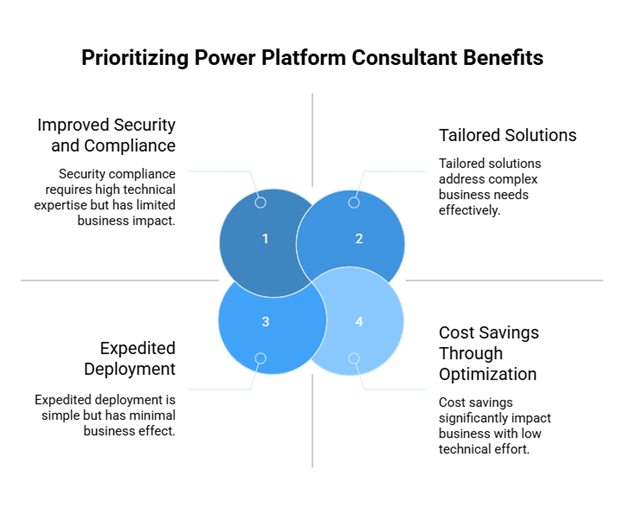
1. Expedited Deployment and Efficiency
The presence of an experienced consultant is of the essence in order that the design, development, and deployment processes may accelerate. Their Power Apps, Power Automate, Power BI, and Power Virtual Agents knowledge allows them to deliver end-to-end solutions with utmost smoothness and without any need for trial and error, so organizations can begin earning revenue from their Power Platform implementation faster.
2. Better Solution Quality
Properly selected consultants ensure your solutions are functional but also reliable, secure, and scalable. They adhere to Microsoft standards, perform rigorous testing, and introduce controls such as role-based access and secure data handling, as well as automated backups to protect your organization’s interests as well as minimize downtime.
3. Tailored Solutions That Fit Your Needs
Even the most advanced solution will fall short without a team trained to use it effectively. Training is provided, manuals are distributed, and continuous support ensures proper adoption. The team addresses questions and resolves issues as they arise, while actively gathering feedback to further enhance the solution’s impact.
4. Reduced Operational Bottlenecks
Some tasks are mechanized with Power Platform consultants, while others streamline workflow, cutting down on business delays and improving productivity, getting work done with less margin for error, and greater team collaboration across departments.
5. Cost Savings Through Optimization
A good consultant looks after your business: helping you avoid costly mistakes, including manual labor; getting automation in working order to reduce downsides; and optimizing licensing and resources to ensure that you get the fullest return from your Microsoft Power Platform.
6. Enabling Data-Informed Decision-Making
When executed competently, Power BI offers value to the process of turning raw data into actionable information. A good consultant develops those dashboards and reports highlighting key metrics, trends, and performance indicators so that the leadership can really focus on smarter data-driven decisions.
7. Support and Maintenance On-Time
Power Platform solutions require regular updates, troubleshooting, and new features addressed to remain effective. A good consultant would provide your organization with ongoing support services so that your business is aligned with the ever-evolving features existing within the Microsoft landscape.
8. Training and User Adoption
Equally powerful, this solution will fail without proper training of your team. A good consultant would take you through the training sessions with user-friendly documentation and even support so that everyone in your organization will feel confident using the platform.
9. Improved Security and Compliance
Compliance and security are critical in today’s data-driven environment. Consultants managing firewalls, intrusion detection systems, enterprise malware protection, and software deployment tools ensure that your Power Platform solutions are developed with security as the top priority.
10. Long-Term Scalability
The right consultant will design solutions that grow with your business. Whether it is more users, interfacing with new systems, or increased automation, a scalable Power Platform setup keeps you prepared for future demand.
Ready to Transform Your Business with Power Platform?
How to Evaluate a Power Platform Consultant Before Hiring?
Hiring a Power Platform consultant is not just about looking at their certifications and projects; it involves making sure they fit your business needs. Below are a couple of steps and considerations to help you choose wisely.

1. Check the Technical Credentials
A capable Power Platform consulting expert from the Microsoft perspective is typically certified: Microsoft Certified: Power Platform Functional Consultant Associate or Power Platform Developer Associate. These certifications prove that a person is familiar with the common set of tools that includes Power Apps, Power Automate, Power BI, and Power Virtual Agents. Beyond certifications, question them about solutions the consultant has implemented, preferably in your industry, so you can see if their skills translate well in practice.
2. Business Acumen
Technical skills do matter, but the consultant should also showcase an understanding of actual business workflows and objectives. Ask the consultant how they could fix a process, join several data sources, or automate repetitive tasks in your company. Apart from what solutions they would provide from a technical point of view, they should explain how these solutions would improve efficiency, cut costs, and ensure satisfaction for the end users.
3. Match Their Experience with Your Industry
Every industry has its compliance requirements, security considerations of data, and operational workflows. A consultant who has worked in your industry will be one step ahead of you in realizing your needs. For example, in regulated industries such as finance or healthcare, knowing governance policies and data handling rules is essential in staying clear of compliance risks.
4. Ask for a Real Problem-Solving Demonstration
One of the best ways to assess a Power Platform consultant is through hands-on testing or case study discussions. Presenting them with real challenges your company faces and asking them to propose a high-level solution demonstrates their problem-solving approach, creativity, and ability to tailor solutions to your specific context.
5. Assess Communication Skills
The role of a consultant enables them to function as a coordinator between tech teams and non-technical stakeholders. During evaluation, watch how clearly they communicate convoluted concepts. If they manage to simplify technical jargon to quick and actionable points, then they may truly be capable of inspiring others across different departments.
6. Ask for Recommendations and Client Feedback
Feedback from past clients can provide valuable insights into a consultant’s work style, professionalism, and results. Ask whether the consultant met deadlines, incorporated feedback, and adapted to changing project requirements. Positive testimonials from former clients serve as the strongest evidence of a consultant’s consistent track record of success.
7. Long-Term Sustenance and Growth
Since the Power Platform is constantly evolving and your business needs will also change over time, it’s essential to ensure the consultant provides after-go-live support and delivers training to enhance capabilities. Maintaining an ongoing partnership with the consultant is crucial for the long-term success of your solution.
Conclusion
In summary, hiring the correct Power Platform consultant makes the difference between a working and a transformative solution. The right consultant will not only be technically experienced in Power Apps, Power Automate, Power BI, and Power Virtual Agents, but will also be an avid problem solver, with a good understanding of business processes and the ability to mold this to your industry.
With great communication skills, collaborating with your internal teams, and being receptive to learning will ensure that your solutions will be relevant, scalable, and future-proof. Moreover, by bridging the gap between technology and business objectives, consultants help your organization to realize new efficiencies, enhanced decision-making, and improved customer experiences.
As the Microsoft Power Platform revamps, working with a good and forward-thinking consultant will ensure that you reap the best returns from your investment and stay ahead in today’s competitive digital market, which secures your journey for transformation into sustainable worth and measurable outcomes.
Ready to hire a Power Platform consultant? Discover our Power Platform Consulting Services to see how we can help, or get in touch with our team to discuss your project.
Frequently Asked Questions
Q1. What are the advantages of Power Apps development services?
Power Apps development services allow businesses to quickly build and deploy custom applications with little coding. These applications speed up work processes, make data more accessible, and work well with Microsoft 365 and other systems for efficiency and innovation.
Q2. How do Power BI consulting services enable better decision-making?
Power BI consulting services transform raw data into interactive dashboards and reports for companies. This offers real-time insights and visualization analytics, allowing the formation of data-based decisions that strengthen the organization’s performance.
Q3. Can Power Automate consultants help with process efficiency?
Yes, Some Power Automate consultants create workflows that automate repetitive manual tasks in approval, notification, and data transfer. This reduces manual work, cuts down errors, and saves employee time.
Q4. What should a Power Platform consultant’s skill set include?
The ideal candidate as a Power Platform consultant has technical knowledge and the capability to solve problems in conjunction with an understanding of business processes. Strong communication skills and openness to learn and adapt to changing Microsoft technologies are required.
Q5. What benefits do Power Virtual Agents provide in terms of customer support?
Power Virtual Agents allow an organization to create an AI-powered chatbot without any coding. These bots work around the clock to address customer inquiries, thereby speeding up their resolutions and easing the burden on human support teams.
Recent Posts
- When Should Businesses Bring in Azure Cloud Experts for Their Projects?
- Azure Cost Optimization: How Businesses Reduce Cloud Spend After Migration
- How Expert Cloud Consultants Manage Risk in Large-Scale Cloud Initiatives?
- Why You Need to Hire an Azure Cloud Engineer in 2026?
- When Should Businesses Hire DevOps Engineers for Cloud-Scale Delivery?
















